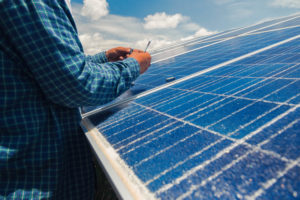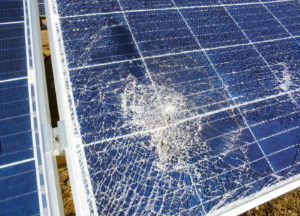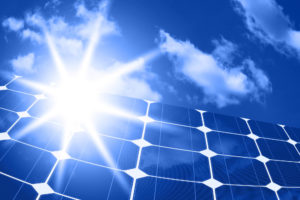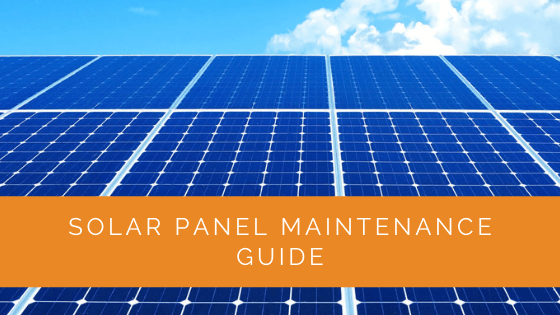Solar panels are excellent sources of renewable energy for household and commercial use. They generally require minimal maintenance, as all you need to do is to clean or wash away the dust or dirt off the panels at least twice a year with a garden hose.
Since solar panels tend to be very durable, their life expectancy stands at around 25 to 30 years without much maintenance. Keep in mind that the expected solar panel lifespan doesn’t mean that the panels will stop producing power; it just means the energy production will decrease by what the manufacturers consider optimal.
Contents
- 1 Key Takeaways
- 2 How Do You Maintain Solar Panels?
- 3 How Do You Repair or Replace Solar Panels?
- 4 How Do You Know If Your Solar Panel Is Bad and Needs Repairing?
- 5 What Is the Standard Warranty for Solar Panels?
- 6 Can You Monitor the Health of Your Solar Panels?
- 7 How Do I Know If My Solar Is Working Properly?
- 8 How Often Do Solar Panels Need to Be Repaired?
- 9 What Is the Life Expectancy of a Solar Panel?
- 10 Expert Insights From Our Solar Panel Installers About Solar Panel Maintenance
- 11 Case Study: Effective Solar Panel Maintenance Ensures Long-Term Performance
- 12 Experience Solar Excellence with Us!
- 13 Conclusion
Key Takeaways
- Solar panels generally require minimal maintenance, primarily consisting of cleaning dust or dirt off the panels 2-4 times a year with a garden hose.
- Repairs or replacements for solar panels should be handled by professionals, especially if panels are still under warranty or have sustained physical damage.
- Regular monitoring and maintenance, such as checking for cracks, discoloration, or darker spots, can help ensure the long-term efficiency and performance of solar panels.
How Do You Maintain Solar Panels?
If your solar panels were installed in a tilted position, you’re in luck. Rainfall can easily clear away the debris that could accumulate on their surface. However, if it doesn’t rain for some time, you may have to clean them manually.
It’s generally recommended that you perform solar panel cleaning about 2 to 4 times a year. Fortunately, this usually doesn’t require much work. All you need is a quick spray with your garden hose or a leaf blower to have your panels clean in no time.
During winter, you might need to clean your panels following heavy snowfall. In case you’re using water to clear the snow away, ensure that it’s lukewarm. You may use a squeegee with a long handle for cleaning. But never use hot water to clean the panels. This is because they are made of tempered glass, which could crack under extreme temperature disparity.
How Do You Repair or Replace Solar Panels?
If your solar panels need replacing or repairing, your best bet is to hire a professional. If your panels are still under warranty (for power output or performance) and are losing efficiency, get in touch with your solar company. They will likely send someone to assess them and either fix or replace the affected panels.
If your panels have sustained any form of physical damage, that should be covered under your homeowners’ insurance or in a separate equipment warranty.
Try finding out if your panels are covered for damage and who you can call to file a claim. Either way, you shouldn’t try installing or repairing solar panels by yourself unless you’re an experienced technician with home solar systems experience.

How Do You Know If Your Solar Panel Is Bad and Needs Repairing?
While solar panels can be very durable, they can still need repairs and/or maintenance. So, how do you know if your solar panels need repair? The following are a few pointers to consider:
Cracks on the Solar Module
Hot spots on solar panels might cause the modules to crack due to dissipated heat. Hot spots usually form on solar panels due to poorly soldered connections or structural defects in the solar cells. Hot spots on solar panels have the following effect on solar panels:
- The part that receives power experiences lower resistance due to the poorly soldered connections
- Voltage increases, causing a hotspot in the solder or cell, resulting in a short-circuit
- Lowered performance and lifespan of the solar panel
Small Cracks
These are often microscopic tears that are practically undetectable in solar cells. Small cracks may occur during the production of the modules and careless handling during shipping or installation.
While micro-cracks won’t result in significant energy loss, they could grow in the long run due to thermal tension caused by disparate weather conditions. The larger cracks could end up damaging your solar cells, causing production loss.
If there’s any damage around the solar panels’ contact points, it can significantly affect the cells’ energy production, which are often wired in a series system. There will also be a significant effect on the total power produced by the solar panel, resulting in lower performance correlated with the number of broken solar cells.
If you spot any cracks on your solar panels, no matter the size, contact a professional immediately to address the issue and avoid major issues in the future.
Discoloration or Snail Trail
Snail trail refers to the discoloration of the solar panel, usually seen after a number of years. If a defective silver paste was used during the manufacturing process, it could lead to this form of discoloration.
Oxidation may occur between the silver paste and the encapsulated material as moisture accumulates on the panel due to the defective silver paste.
Snail trail will often lead to a chemical breakdown towards the frontal part of the panel, which becomes visible. This greatly reduces the performance of the solar panel. Plus, snail trails may also cause microscopic cracks, which usually decrease the power production capacity of the panel.

Darker Spots on the Panel
Solar panels are usually designed to be both air- and water-tight. This is achieved by laminating the components (glass layer, solar sheets, and back sheet) in a vacuum. If the lamination process was not done correctly, it could lead to the detachment or delamination of the laminated components.
Internal corrosion or rusting as a result of delamination may cause darker spots on the solar panel. If moisture penetrates into the panels, it causes rusting or corrosion. Darker spots will usually start at the end of the panel and may spread around, resulting in a reduction in the production capacity of the panel.
What Is the Standard Warranty for Solar Panels?
You want to make sure that you’re getting a good warranty for your solar panels before purchasing. Why? Well, the efficiency of solar panels will naturally decrease, and you may need professional maintenance that could cost you thousands of dollars.
A good solar company will provide a warranty of between 15 to 25 years, along with a guarantee that the energy production of your solar system will remain 85% or above the entire time.
Can You Monitor the Health of Your Solar Panels?
Integrating a solar panel monitoring system will be helpful in tracking and monitoring how much energy your panels are producing at any given time and how much they produce over time. This will let you see exactly how various factors will influence the performance of your panels and how well they maintain their efficiency across their life. A monitoring system will also send an alert in case a panel needs repairing or replacement.
How Do I Know If My Solar Is Working Properly?
One simple health check is looking at the color of the lights shining on the inverter box during the day, when the system is meant to be working. Green lights on the box means that the system is functioning as it should. Orange or red lights during the day could mean there’s a system event or fault.
If there’s a red flashing light, be sure to look for an error code on the display. Alternatively, you may look up the inverter’s user interface through a web portal to find out more about the cause.
How Often Do Solar Panels Need to Be Repaired?
As mentioned earlier, solar panels usually require little maintenance over their 20 to 30+ year lifespan. And unless your solar PV system was incorrectly installed, has bad parts, or an outside factor caused damage to the system, there are little repairs needed to keep it running in tip-top shape. In fact, in many cases, you won’t even have to worry about cleaning your panels.
There’s a good reason for this. Unlike most complex household machines, like cars, HVAC systems, wind turbines, etc., usually have few moving parts. They are incredibly simple for the kind of work they do.
With this in mind, the most complex part of the system will be the solar panel system inverter, which is the most likely to have issues. But you don’t have to worry about that. Most inverter brands offer warranties that should cover any issues should they come up within the first 10 to 25 years. Most solar battery brands also come with warranties, though they are usually much shorter than inverters’ and solar panels’.

What Is the Life Expectancy of a Solar Panel?
While the lifespan of solar panels is around 25 years, it doesn’t mean that they will stop producing electricity after that time has lapsed. It simply means that energy production has declined by an amount that the manufacturers consider significant.
Your solar panels will continue working for many decades after installation, provided they are not damaged by debris, wind, or other external factors. This is simply because they don’t have any moving parts, and they rarely break from within; they are mostly damaged by external factors like inclement weather or a poor racking setup.
Expert Insights From Our Solar Panel Installers About Solar Panel Maintenance
Regular cleaning of your solar panels, ideally 2-4 times a year, is crucial to maintain their efficiency. Use a garden hose or leaf blower to remove dust and debris, but avoid using hot water, especially in cold weather, to prevent cracking.
Senior Solar Technician
Keeping an eye out for physical damage, like cracks or discoloration, is essential. If you notice any issues, it’s best to call a professional for repairs to ensure the longevity and performance of your solar panels.
Solar Maintenance Expert
Monitoring your solar system’s output is key to spotting potential problems early. Integrating a solar panel monitoring system can alert you to performance issues, helping you address them before they escalate.
Renewable Energy Consultant
Case Study: Effective Solar Panel Maintenance Ensures Long-Term Performance
Background
Solar Panels Network USA was approached by a homeowner concerned about maintaining their solar panel system to ensure its efficiency and longevity. The homeowner wanted to understand the best practices for regular maintenance and how to address potential issues promptly.
Project Overview
The project aimed to educate the homeowner on effective solar panel maintenance practices, perform a comprehensive inspection of their current system, and establish a routine maintenance schedule to ensure optimal performance.
Implementation
- Initial Inspection:
- System Check: A thorough inspection of the solar panel system was conducted to assess its current condition. This included checking for physical damage, discoloration, and debris accumulation.
- Performance Monitoring: The system’s energy output was analyzed to identify any potential inefficiencies or drops in performance.
- Establishing a Maintenance Routine:
- Cleaning Schedule: A cleaning schedule was established, recommending the homeowner clean the panels 2-4 times a year using a garden hose or leaf blower. During winter, lukewarm water and a long-handled squeegee were advised for snow removal.
- Visual Inspections: Regular visual inspections were suggested to check for cracks, discoloration, and darker spots on the panels. The homeowner was advised to contact a professional immediately if any issues were detected.
- Addressing Potential Issues:
- Professional Repairs: It was recommended that all repairs or replacements be handled by professionals, especially if the panels were still under warranty or had sustained physical damage covered by insurance.
- Monitoring System: Installation of a solar panel monitoring system was advised to track energy production and alert the homeowner to any performance issues.
- Providing Resources and Support:
- Educational Materials: The homeowner was provided with detailed guides and resources on solar panel maintenance, including troubleshooting tips and contact information for professional services.
- Warranty and Insurance Review: Assistance was offered to review the warranty and insurance policies to ensure coverage for potential repairs and replacements.
Results
- Improved System Efficiency: Regular cleaning and inspections led to improved system efficiency and maintained optimal energy production levels.
- Early Issue Detection: The monitoring system allowed for early detection of potential issues, preventing major problems and costly repairs.
- Enhanced Longevity: The proactive maintenance approach ensured the solar panel system’s longevity, providing the homeowner with a reliable and sustainable energy source.
Summary
This case study highlights the importance of regular solar panel maintenance to ensure long-term performance and efficiency. By establishing a routine cleaning schedule, conducting regular visual inspections, and utilizing a monitoring system, Solar Panels Network USA helped the homeowner maintain their solar panel system effectively. The project underscored the value of professional repairs and thorough warranty and insurance reviews, ensuring the homeowner’s investment in solar energy was well-protected.
Experience Solar Excellence with Us!
Trust in Solar Panels Network USA, where our seasoned experts deliver top-quality solar solutions for homes and businesses nationwide. With a legacy of countless successful installations and a commitment to sustainable energy, we’re your reliable partner in the solar journey. Ready for a brighter, eco-friendly future? Call us now at (855) 427-0058 and harness the power of the sun!
Conclusion
Solar panel maintenance is a relatively simple process that can ensure the longevity and optimal performance of your renewable energy system. By prioritizing a strong warranty, comprehensive insurance coverage, and regular removal of debris and dirt accumulation, you can expect your solar panels to operate at peak efficiency for many years.
Additionally, it is essential to incorporate a thorough solar panel maintenance checklist into your routine. This checklist should include regular inspections of your system, checking for any abnormalities in your electricity bill or unexplained inconsistencies in its operation. If you encounter such issues, don’t hesitate to reach out to your trusted solar maintenance provider. They possess the expertise to identify and address any potential problems promptly.
By following these maintenance practices and being proactive in seeking professional assistance when needed, you can maximize the benefits of your solar panel investment and enjoy a sustainable source of energy for decades to come.
About the Author
Solar Panels Network USA stands at the forefront of solar energy solutions, driven by a team of seasoned solar engineers and energy consultants. With over decades of experience in delivering high-quality solar installations and maintenance, we are committed to promoting sustainable energy through customer-centric, tailored solutions. Our articles reflect this commitment, crafted collaboratively by experts to provide accurate, up-to-date insights into solar technology, ensuring our readers are well-informed and empowered in their solar energy decisions.

